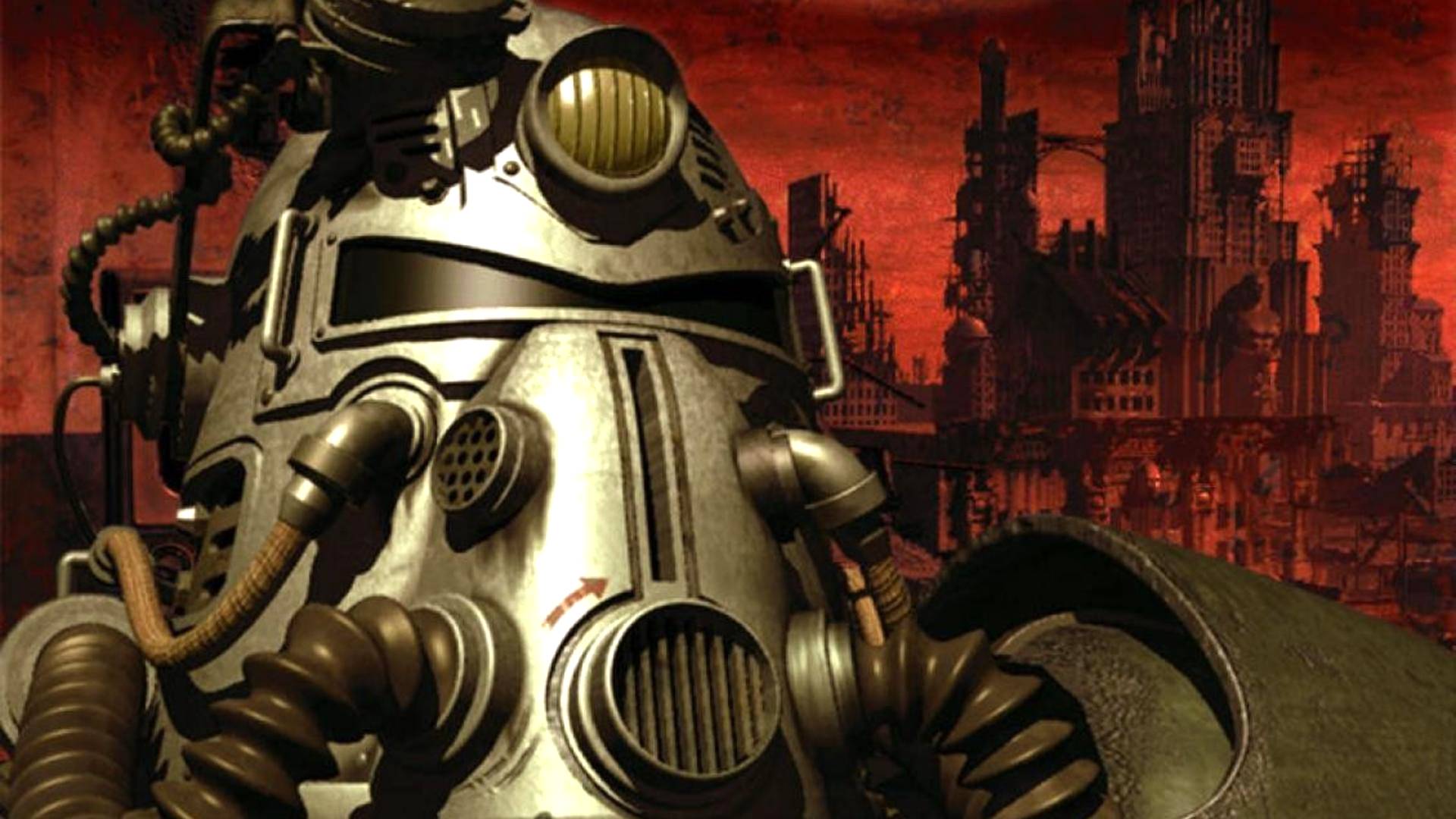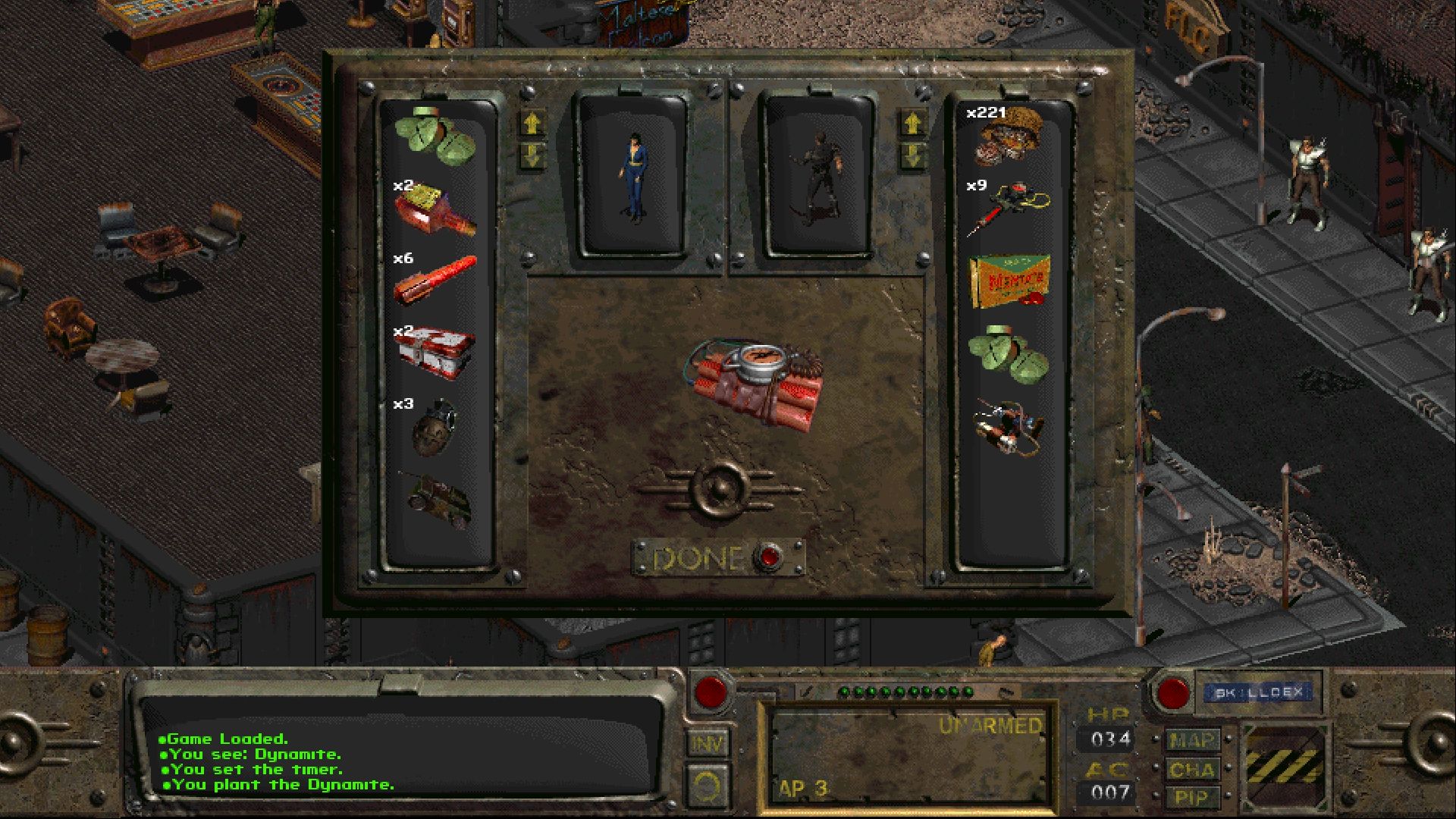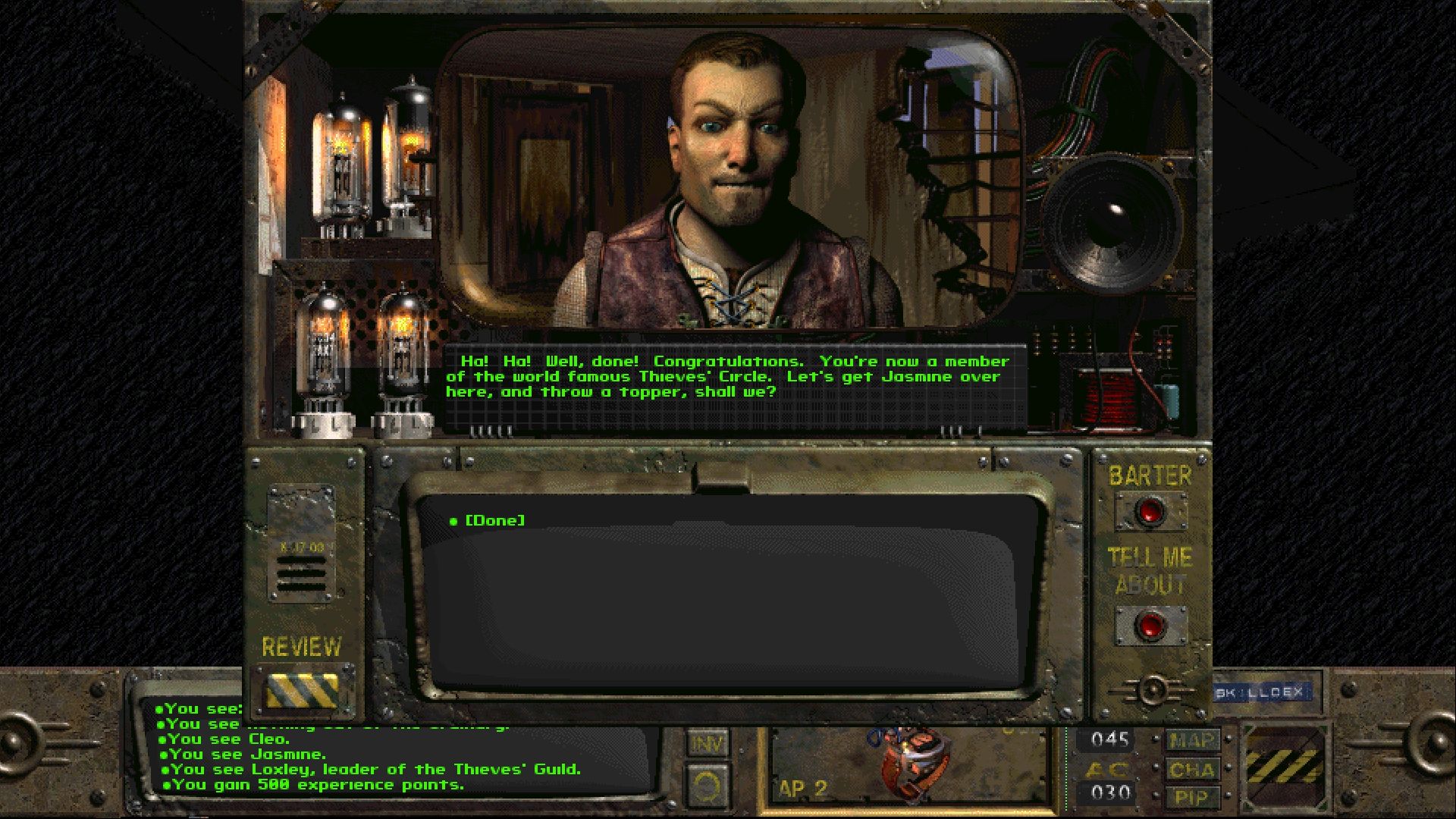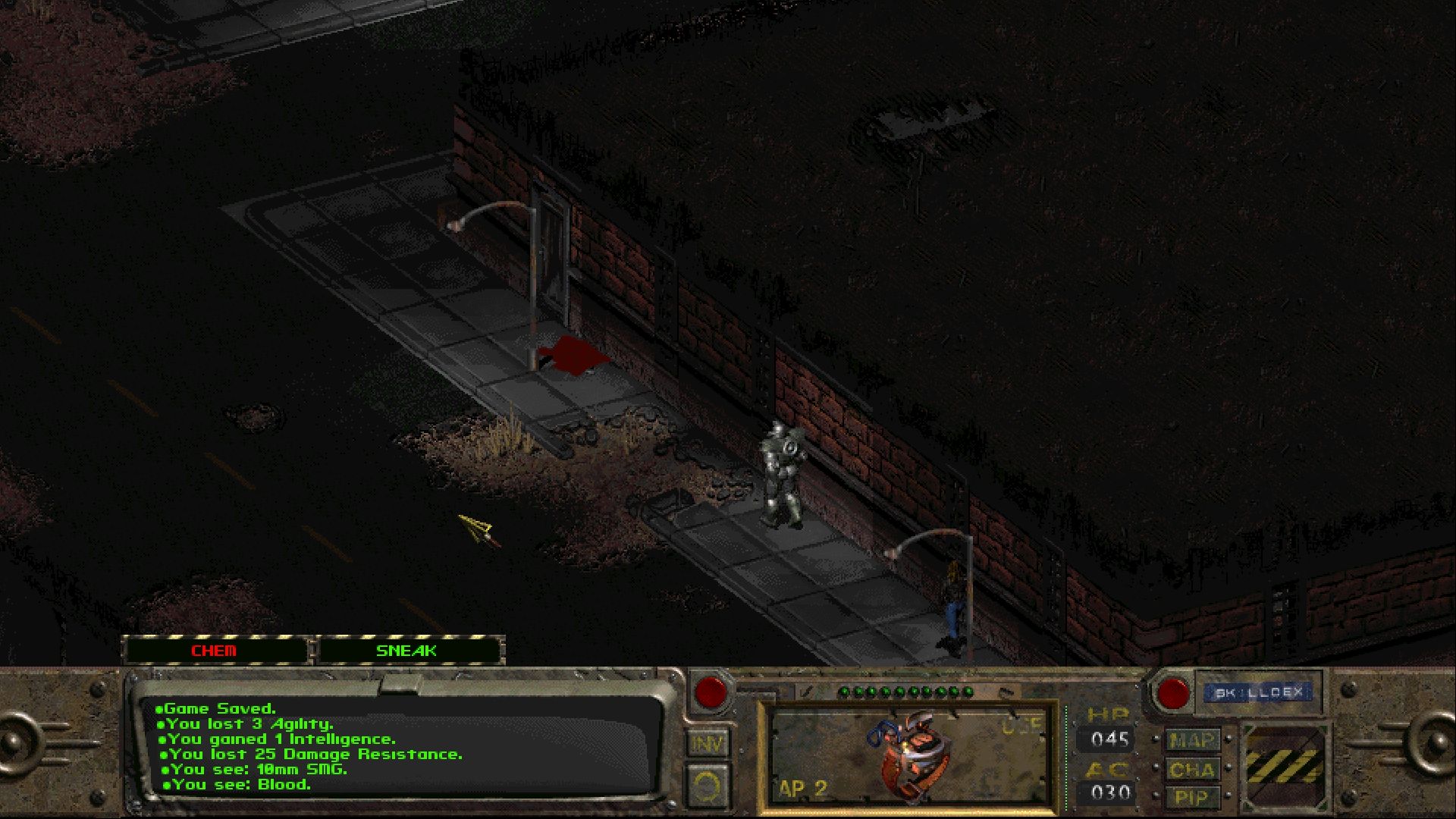Fallout's greatest invention is the reverse-pickpocket pants explosion
Got to pick a pocket or two, one, fire in the hole!

Sign up for breaking news, reviews, opinion, top tech deals, and more.
You are now subscribed
Your newsletter sign-up was successful
Boom. Boom. Then a minute of quiet, during which newcomers to The Hub must have wondered whether the California trading town had revived the 21-gun salute, or replaced church bells with dynamite. Nobody was running or screaming. Perhaps it was simply two o’clock.
Then, once more: boom. This was the sound of Kane the door guard exploding, in three parts. One stick of dynamite, I’d discovered, was not enough. Decker’s right-hand man was too much of a tough bastard for that, somehow maintaining his bodily integrity and dusting himself off after 40-odd points of damage. And so I’d set three bombs on three separate timers, and stuffed them into every available pocket on his leather-clad person. Then I’d walked halfway across town to hover vaguely between Bob’s Iguana Stand and the local police station, by way of an alibi. At first, I listened for the telltale toll that would let me know Kane was no more. But then, as the seconds ticked by, I scrolled my isometric camera west until I could see my victim standing in the street outside the Maltese Falcon. It’s like David Harbour says when he pulls the pin on an enemy’s grenade belt in Violent Night: you gotta watch.
When the final explosive went off, Kane was torn apart like focaccia. That’s no exaggeration: some of Fallout’s death animations have to be seen to be believed. But the consequences of his death didn’t extend beyond that blast radius. Since nobody had seen me fiddle with Kane’s trousers, or lurking in the area during the aftermath, I was scot-free. And the door he’d been guarding, behind which hid the insidious leader of The Hub’s underworld? Mine to open.
This is the power of the reverse-pickpocket, enabled by the unusual flexibility of Fallout’s RPG mechanics. It’s a ludicrous idea that’s left a surprisingly long legacy, all made possible by a very mundane piece of the puzzle: the barter system.
Cap America

Longtime Fallout players will know that, upon returning to town after a dungeon crawl, you don’t get to sell all your treasures for cash. Yes, some of those ancient doodads will be exchanged for bottle caps, the de facto currency of the realm. But rarely will a given trader have enough caps to cover all of your goods – and so you’ll begin the process of swapping items until both parties are convinced they’re not being ripped off. A spare pistol in exchange for a few Mentats and a length of rope? Sure, that’ll do it. It’s a smart system that forces you to figure out what ‘valuable’ means in the wasteland.
The kicker is that the nascent Black Isle Studios – then merely known as developer Interplay’s internal RPG team – got plenty of extra use out of its bartering menu. Pick up a companion, and you might want to trade them a big gun and some stimpaks in return for diddly-squat. Not a great deal, you might think – until you next enter combat, and see your comrade draw on those very tools when under fire.
Then, of course, there’s pickpocketing – which functions exactly like bartering but without consent. You can grab whatever you like for free, but have to weigh that opportunity against the percentage chance of discovery. Opening hostilities in the middle of a shop on the busy ruins of former Los Angeles rarely ends well. The twist is that, just as you can lift items from NPCs, you can put new ones in their place. Early in the game, a sheriff in Junktown asks you to plant a bug on local ganglord Gizmo using precisely that method. But more fun is the explosives, just awaiting their perfect application.
Sign up for breaking news, reviews, opinion, top tech deals, and more.
Blaster thief

Welcome to the Thieves’ Guild, where ne'er-do-wells with names like Loxley and Smitty plot to rob a necklace from the manor of a merchant named Daren Hightower. As high fantasy as it sounds, all this scheming takes place in the basement of a post-apocalyptic flophouse in The Hub’s junkie district. Fallout never had a Thieves’ Guild again, and even this one amounts to only a single mission. Yet it’s the ideal context in which to chain together the game’s silliest skills and blow a man to bits.
I plant plastic explosives down his undies in preparation for the most devastating wedgie of all time
First, the setup. Hightower is a water merchant who, after a threat to his life, never leaves his home – a vast, corrugated steel bungalow that takes up almost the entirety of The Hub’s least-dilapidated district. The necklace in question lies in a trapped and locked box adjacent to Hightower’s study, which he only vacates at night. That means going in after dark, when the patrolling guards shoot on sight.
With a high Sneak skill and the right route, it’s almost possible to get in and out quietly, as the Guild requests. But a single guard stands in the way. Thankfully, it’s a door guard, and we know how to deal with those.
The unlucky target’s name is George. During the day, before the heist, I plant plastic explosives down his undies in preparation for the most devastating wedgie of all time. I set the timer for 60 seconds, and I leave the map. The latter step might sound extreme, but the grounds of Hightower’s estate aren’t large enough for me to escape the crime without leaving the area completely. Once I return to The Heights in the evening, George is but a smear on the sidewalk, and nobody can stop the necklace from walking out that door.
What’s extraordinary is that Fallout remembers. Even when you move from one level to another, some part of the game is still tracking that ticking timebomb, and the damage due to poor George. Though visually uneven and quite buggy, this is a remarkably robust RPG – determined to honor whatever leftfield solution you throw at it. That meticulous commitment to consequences is what makes it still electrifying to play, and what made sense of Bethesda’s decision to buy and revive the Fallout series in the noughties.
Shady business

Evidently, Bethesda is fond of the reverse-pickpocket too – or the Shady Sands Shuffle, as Three Dog refers to it on Galaxy News Radio. The developer implemented the move flawlessly in Fallout 3 – as an addendum to the barter system, just as it had been back in ‘97.
A mechanical quirk that might easily have dropped off the to-do list of a hundred-hour RPG instead became a source of celebration. ‘Pants exploded’ appears as a player statistic on loading screens, and the Psychotic Prankster achievement rewards those who plant a live explosive in a character’s pocket. There’s a sick satisfaction to be found in transforming a lunchbox into a bottlecap mine, and then packing that lunch for an unsuspecting NPC.
The Shady Sands Shuffle even made the leap to Skyrim. Climb high enough up the Pickpocketing skill tree and you can unlock the ability to silently harm enemies by placing poisons in their pockets. It’s a subtler and arguably more effective way of disposing of a door guard. But I have to say, I’ll always prefer the sight of a man spontaneously coming apart at the seams. It has a way of sticking in the memory.

Jeremy is TRG's features editor. He has a decade’s experience across publications like GamesRadar, PC Gamer and Edge, and has been nominated for two games media awards. Jeremy was once told off by the director of Dishonored 2 for not having played Dishonored 2, an error he has since corrected.